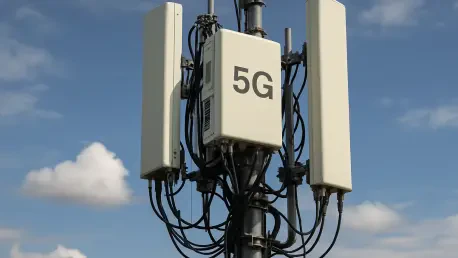In an era where seamless connectivity is no longer a luxury but a necessity, a major telecommunications provider in the UK has taken a monumental step forward by expanding its cutting-edge 5G Standalone network to an impressive 500 towns and cities across the nation. This ambitious rollout, covering over 70% of the UK population—roughly 49 million people—ushers in a new wave of mobile technology that promises faster speeds, broader coverage, and significantly reduced latency. What sets this development apart is the commitment to accessibility, as customers with compatible devices and SIMs can tap into these enhanced capabilities at no extra cost. This initiative not only elevates the standard of mobile experiences for millions but also positions the provider as a leader in the telecommunications landscape, ready to meet the growing demands of both consumers and businesses. The impact of this expansion signals a transformative shift, redefining how connectivity shapes daily life and industrial innovation.
Technological Leap with 5G Standalone
The introduction of a fully independent 5G Standalone network marks a significant departure from earlier 5G services that relied on 4G infrastructure for data transmission. Unlike its predecessors, this end-to-end system operates with the latest radio technology and a cloud-based 5G core, delivering unparalleled reliability and expansive coverage. This technological advancement translates into a smoother, more consistent mobile experience for users across the 500 locations, ensuring that whether in urban centers or smaller towns, connectivity remains robust. Beyond immediate benefits, this infrastructure paves the way for groundbreaking applications such as autonomous transport, remote healthcare, and robotic industrial solutions. These innovations, already accessible to enterprise customers, highlight how this network is not just about speed but about enabling a future where technology integrates seamlessly into critical sectors, reshaping operational efficiency and service delivery.
Equally noteworthy is the meticulous planning behind achieving at least 90% outdoor coverage in each of the 500 towns and cities. This benchmark ensures that users can depend on a stable connection for everything from streaming high-definition content to conducting real-time business operations outdoors. A notable milestone in this journey is the inclusion of historic locations like Bakewell in Derbyshire, celebrated as the 500th area to receive the upgrade. The growing adoption of 5G Standalone-compatible devices among consumers further underscores the readiness for this technology, with many flagship handsets now equipped to leverage these advanced networks. This trend reflects a broader shift in user behavior, where the demand for faster, more reliable connectivity drives the uptake of cutting-edge hardware. As a result, the foundation is set for widespread utilization, ensuring that the benefits of this network extend beyond technical specifications to tangible improvements in daily digital interactions.
Industry Impact and Future Prospects
From an industry standpoint, the expansion to 500 locations is a pivotal achievement that redefines mobile connectivity for millions of users through enhanced performance and dependability. Insights from experts like Kester Mann, Director of Consumer and Connectivity at CCS Insight, emphasize that this rollout is more than a numerical milestone; it’s a catalyst for transformative change, particularly in the enterprise sector. The improved speeds and reduced latency offered by this standalone network create opportunities for businesses to adopt innovative solutions, from smart logistics to advanced manufacturing processes. This development aligns with a vision of connectivity that transcends basic communication, fostering digital experiences that could redefine operational models across various industries. The ripple effect of such advancements promises to elevate the competitive edge of companies that harness these capabilities early on.
Moreover, this network expansion is a cornerstone of a broader Mobile Transformation Plan, backed by a substantial investment of approximately £700 million in the current year. The plan focuses on strengthening both 4G and 5G coverage, deploying small cells in densely populated urban areas, and tackling connectivity challenges in high-traffic zones like railways, airports, and stadiums. A strategic agreement to acquire 78.8 MHz of spectrum from another major UK operator further bolsters the provider’s network capacity, increasing its total mobile spectrum holding to about 30%. This move ensures long-term competitiveness and the ability to handle growing data demands. Daily investments of £2 million, as highlighted by Chief Technology Officer Jeanie York, reflect an unwavering commitment to reliability and customer satisfaction, setting a high standard for what modern telecommunications networks should achieve in addressing both current needs and future growth.
Building a Connected Tomorrow
Reflecting on this landmark rollout, the deployment of the 5G Standalone network across 500 UK towns and cities stands as a defining moment in enhancing mobile connectivity for over 70% of the population. The use of advanced, independent infrastructure delivers superior performance and reliability, while also laying the groundwork for future digital advancements. Supported by a £700 million investment plan and strategic spectrum acquisitions, this initiative demonstrates a steadfast dedication to improving user experiences and driving innovation. The celebration in Bakewell and endorsements from industry experts underscore the balance between community impact and leadership in the telecommunications sector. Moving forward, the focus should shift to sustaining this momentum by expanding coverage further, particularly in underserved areas, and accelerating the development of next-generation applications. Collaboration with industries and policymakers could amplify the potential of this technology, ensuring that connectivity continues to be a catalyst for progress and inclusion across the UK.









